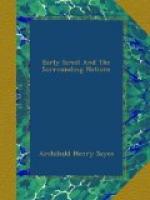Of the religion of the Edomites we know but little. The supreme Baal was the Sun-god Hadad; another god worshipped by them was Qaus or Kos. Of goddesses we hear nothing. The Israelites, however, recognised in the Edomites brethren of their own, whose religion was not far removed from that of the descendants of Jacob. An Edomite of the third generation could enter “into the congregation of the Lord,” and we hear of no rival deity in Edom to Yahveh of Israel. Indeed, in the old poetry of Israel Yahveh was said to have risen up “from Seir,” and the charge brought against Edom by the prophet Obadiah is not that of idolatry or the worship of a “strange god,” but of standing on the side of the “foreigners” on the day that Jerusalem was destroyed.
The southern part of Edom was known as Teman; it was to the east of Teman that the Kadmonites or “children of the East” pitched their tents. We first hear of them in an Egyptian papyrus of the age of the Twelfth dynasty (B.C. 2500). Then they received with hospitality a political fugitive from Egypt; he married one of their princesses and became one of their chiefs. Their wisdom was celebrated in Palestine like that of their Edomite neighbours of Teman, and the highest praise that could be bestowed on Solomon was that his “wisdom excelled all the wisdom of the children of the East.”
Not far from the camping-places of the Kadmonites was the land of Uz, famous as the home of Job. Uz, in fact, was a province of Edom; Edomite colonists, so we are told in the Book of Lamentations,[11] inhabited it. Indeed, it has been suggested that the difficulties presented by the language of the Book of Job are due to the fact that it is the language of Edom rather than of the Jews, differing from the latter only as an English dialect may differ from that of a neighbouring county. At all events, Job was as much a hero of Hebrew as of Edomite tradition, while the last chapter of the Book of Proverbs contains the wise sayings of a king whose territory adjoined the land of Edom. Lemuel, according to the Hebrew text, which is mistranslated in the Authorised Version, ruled over Massa, and Massa, the Mash of Genesis, is described in the Assyrian inscriptions as that part of northern Arabia which spread eastward from Edom. The Hebrew of Palestine doubtless included it in the country of “the children of the East.”




